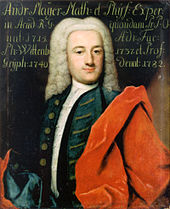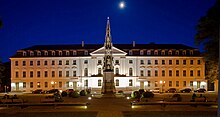Andreas Mayer (mathematician)
Andreas Mayer (born June 8, 1716 in Augsburg , † December 19, 1782 in Greifswald ) was a German mathematician , architect , astronomer and cartographer .
Life
Andreas Mayer was the son of the Augsburg builder and architect Andreas Mayer († 1733). He was initially trained by his father in earth surveying and architecture. At the age of eleven, he attended high school in his hometown. Six years later, in October 1733, he began studying mathematics and physics at the University of Wittenberg with a grant from the Augsburg Council . His teachers included Johann Matthias Hase , Johann Friedrich Weidler in mathematics, Martin Gotthelf Löscher in physics and Samuel Christian Hollmann in philosophy.
In 1735 he continued his studies in Berlin, where he expanded his knowledge of astronomy with Christfried Kirch . In the same year he went to the University of Marburg , where he met Christian Wolff and attended his lectures on metaphysics. In 1736 he returned to the Wittenberg University and received his doctorate on October 17, 1736 under Johann Kaspar Haferung as a master of philosophy. On October 19 and 20, 1736, with the dissertation de infinitia curvarum subevolutis, he acquired permission to read for universities as Magister Legens . After the dissertation de Phaenomenis Solis per Lunam recti & Lunae per umbram telluris obscurantae held under Hase on July 3, he was accepted on July 5, 1737 as an adjunct at the philosophical faculty.
1741, he was on the recommendation of Wolff as a professor of mathematics and astronomy at the time to Swedish Pomerania part of University of Greifswald appointed. He received the professorship for physics there in 1749 and taught in that capacity until his death. In 1755 he was accepted as a foreign member of the Royal Prussian Society of Sciences .
His older son Johann Christoph Andreas Mayer became a well-known physician and personal physician to the Prussian King Friedrich Wilhelm II. The younger son Ernst Friedrich Christian Mayer became a pastor in Königsberg (Prussia).
Act
Mayer's work was largely shaped by Wolff's pragmatic Enlightenment philosophy . Today he is known as the builder of the late baroque main building of the University of Greifswald (1747–1750). With him as dean of the philosophical faculty , the writer Anna Christina von Balthasar received her doctorate in 1750 on the baccalaurea artium . This doctorate is considered to be one of the first to be awarded an academic degree to a woman in the German-speaking area.
Since 1747 Mayer was commissioned by the Swedish government in Pomerania to the annual -Swedish Pomeranian - Rügianischen Staatskalender out. In addition to astronomical calculations and a chronological representation of secular, ecclesiastical and historical events of the corresponding year, the calendar also contained a list of the people entrusted with public offices in Swedish Pomerania .
Mayer mapped Swedish Pomerania and published the first reliable map for this region in 1769. He established scientific astronomy at the University of Greifswald and initiated the establishment of the first observatory in Greifswald . In 1775, at his instigation, the first astronomy professorship in Greifswald was awarded to his pupil and later successor in office, Lampert Hinrich Röhl (1733–1790). Röhl also became the first director of the new observatory.
Works
- Diss. De infinitia curvarum subevolutis. Wittenberg 1736
- Diss. De scapi contrahendi ratione. Wittenberg 1736
- Diss. Pro-Loco. Wittenberg 1737
- Diss. De praecipuis eclipsium Solis et Lunae a. 1737 imminentium phenomenis. Wittenberg 1737
- Diss. De optima Scapi contrahendi ratione. Wittenberg 1738
- Elementa theologiae naturalis sacrarum litterarum doctrinia conformia, et ad ductum Christiani Wolfii adornata. Hall 1739
- Oratío de augustissimi ac potentissimi Regis ac Domini Friderici I, Suecorum, Gothorura et Vandalorum, Regis etc. meritis' in universam mathesin. Greifswald 1741
- Progr. De regulis, ad quas scientiarum usus et praestantia exigí debet. Greifswald 1742
- Diss. De secundo telluris nostrae satellite. Greifswald 1742
- Progr. Ad observandum Phaenomena Lunae per umbram telluris d. 30 Augusti 1746 obscuratae. Greifswald 1746
- Progr. De flammarum ardentium sensu hieroglyphico. Greifswald 1747
- Progr. De angelorum lingua. Greifswald 1747
- Progr. De gloria Domini pastoris circumfulgente. Greifswald 1747
- Progr. De triduo inter mortem Christi et resurrectionem. Greifswald 1747
- Progr. Phaenomena Solís d. 25 Jul. 1748 a Luna tecti. Greifswald 1748
- Progr. De obligatíone hominum ad philosophandum. Greifswald 1750
- Progr. Phaenomena defectus lunaria d. 8 Jul. 1751. Greifswald 1751
- Invitado ad Solstitii observationem ope gnomonis astronomici. Greifswald 1751
- Num tempestatum futurarum praenuntiandarum satis fundata dentur argumenta. Greifswald 1756
- Dessein du nouveau College de l'Academie Royale a Greifswalde etc. Greifswald 1755 7 copper plates in fol.
- Progr. De praeclaris in Academiam from optimo Rege collatís, beneficiis. Greifswald 1762
- Observationes Veneris Gryphiswaldenses, quibus adiecta est M. Lamberti Henrici Roehlii, Reg. Obs. Astron. Observationis suac de transitu Veneris per Solem expositio. Greifswald 1762
- Pomeraníae anterioris Suedicae ac Principatus Regiae Tabula nova. Greifswald 1763
- Diss. De deviatione et reciprocatione penduli. Greifswald 1767
- Progr. De artium discrimine in liberales et illiberales. Greifswald 1773
- Draft of the principles of economical use of timber. Greifswald 1776
- Diss. Sistens acus inclinatoriae phaenomena. Greifswald 1777
- Om Greifswalds Stads Geographiska belägenhet. In: Stockholms Wetenskamps - Academiens Handlingar T. XVII (1759)
literature
- Mayer, Andreas. In: Johann Heinrich Zedler : Large complete universal lexicon of all sciences and arts . Volume 19, Leipzig 1739, column 2334 f.
- Johann Georg Meusel : Lexicon of the German writers who died from 1750 to 1800. Gerhard Fleischer d. J., Leipzig, 1808, Volume 8, p. 560 ( digitized version )
- Theodor Pyl : Mayer, Andreas . In: Allgemeine Deutsche Biographie (ADB). Volume 21, Duncker & Humblot, Leipzig 1885, p. 87 f.
- Michael Lissok: Mayer, Andreas (1716–1782). In: Dirk Alvermann , Nils Jörn (Hrsg.): Biographisches Lexikon für Pommern . Volume 1 (= publications of the Historical Commission for Pomerania. Series V, Volume 48.1). Böhlau Verlag, Cologne Weimar Vienna 2013, ISBN 978-3-412-20936-0 , pp. 180-182.
Web links
- Correspondence between Andreas Mayer and Carl von Linné
Individual evidence
- ↑ Different dates of birth July 4, 1715 (Handbuch des Prussischen Nobility, 1892); July 8, 1715 (Zedler)
- ↑ Heinz Kathe : The Wittenberg Philosophical Faculty 1502-1817 (= Central German Research. Volume 117). Böhlau, Cologne / Weimar / Vienna 2002, ISBN 3-412-04402-4 , pp. 455-470.
- ^ Fritz Juntke: Album Academiae Vitebergensis - Younger Series Part 3. Halle (Saale) 1966, p. 299
- ^ Members of the previous academies. Andreas Mayer. Berlin-Brandenburg Academy of Sciences , accessed on May 5, 2015 .
| personal data | |
|---|---|
| SURNAME | Mayer, Andreas |
| BRIEF DESCRIPTION | German mathematician, architect, astronomer and cartographer |
| DATE OF BIRTH | June 8, 1716 |
| PLACE OF BIRTH | augsburg |
| DATE OF DEATH | December 19, 1782 |
| Place of death | Greifswald |

